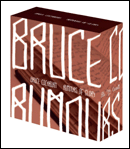
The Charity Of Night (1996)

Rumours of Glory - box set Disc 6 (2014) [compilation album]
| Found on: |
 The Charity Of Night (1996) |
 Rumours of Glory - box set Disc 6 (2014) [compilation album] |
Night, like peace,The all-night stragglers stagger home
Is a state of suspension
Tomorrow the heat will rise
And mist will hide the marshy fields
The mango and the cashew trees
Which only now they're clearing brush from under.
Rusted husks of blown up trucks
Line the roadway north of town
Like passing through a sculpture gallery
War is the artist
But he's sleeping now
And somebody will be peddling vials of penicillin stolen out of all the medical kits sent to the countryside.
And in the bare workshop they'll be molding plastic into little prosthetic limbs
For the children of this artist
And for those who farm the soil that received
His bitter seed...
Musicians:
Bruce Cockburn: Resophonic and Electric Guitars and Vocal
Gary Craig: Drums, Percussion
Rob Wasserman: Bass
Janice Powers: Mongolian keyboard thing
Jonatha Brook: Backup Vocals and Arrangement
Early 1998
[Introducing "The Mines of Mozambique," Bruce commented] "Your country, the USA, still hasn't signed the landmine treaty, even though the rest of the industrialized world has. People, children are being killed by those things and your politicians are just sitting around playing with their dicks-- not that
there's anything wrong with that, of course!"